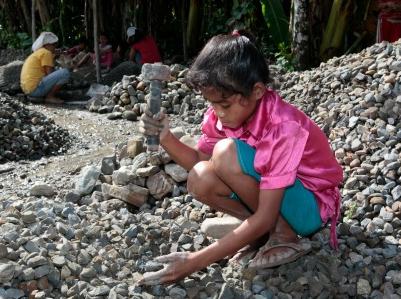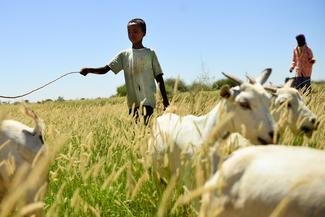Child labor in tobacco growing is very dangerous and prohibited worldwide. Nevertheless, children work in the fields in all major tobacco-growing countries. Many suffer from the green tobacco disease.
Children in the fields
In Malawi alone, around 78,000 children work on the tobacco plantations. Child labor in tobacco cultivation is also widespread in Brazil, Indonesia, the USA and other countries.
The U.S. Department of Labor publishes a list of the goods produced by forced and child labor every year. In 2016, 16 countries were on the list for tobacco, but the USA is not mentioned there. 1
Children from 5 years of age prepare seed beds by digging fields and cutting down trees. They weed in the fields, they fertilize the tobacco and they spray pesticides without wearing protective clothing.
When harvesting the green tobacco leaves, they are exposed to the risk of nicotine poisoning. Because they absorb the nicotine from the leaves through the skin into the body. Even a small amount of the neurotoxin leads to nicotine poisoning: Green tobacco disease causes nausea, vomiting, headache, dizziness and weakness attacks.
Child laborers in Malawi absorb up to 54 milligrams of nicotine a day through the skin, a study by Plan International shows. That’s as much nicotine as there is in 50 cigarettes.
Why do they work in tobacco growing??
With their work, these children contribute to the income of their families who do not make ends meet come would.
This is due to the low prices that tobacco companies and plantation owners pay for the harvest. This means that the farming families have to grow more tobacco than they can do with the adult workers. The farmers cannot afford seasonal workers. However, children and other relatives are usually not paid. That is why growing tobacco is family work.
Why is child labor bad??
Child labor in tobacco growing is dangerous because the children are exposed to chemicals. The plant itself is also poisonous. Working in tobacco growing can cause the following injuries and diseases:
- Poisoning like green tobacco disease
- Skin rashes, allergic reactions, difficulty breathing, visual problems, chemical poisoning, liver damage, nervous disorders and infertility by handling chemicals like fertilizers and pesticides
- Bone and joint deformation due to carrying heavy loads
- Back pain during the harvest
- sunstroke
- Snake bites and diseases caused by mosquitoes
- Cuts and blisters
- severe exhaustion and tiredness
Work also jeopardizes children’s development and prevents children from receiving adequate schooling so that they cannot break out of the poverty cycle.
And finally, children who work in tobacco growing are exploited because their labor is not paid.
According to Article 32 of the UN Convention on the Rights of the Child, child labor is permitted if it is easy and safe work. This is not the case with tobacco growing: children under the age of 18 are therefore not allowed to carry out any work that has to do with tobacco production.
How can child labor in tobacco growing be prevented??
Tobacco companies have to pay higher prices so that farming families can make a living without using their children’s work. The tobacco industry’s corporate social responsibility programs such as the Eliminating Child Labor in Tobacco Growing Foundation are only image maintenance.
The fundamental rights of tobacco farmers and workers on tobacco plantations e.g. in Malawi must be respected. You need legally enforceable contracts and adequate payment.
Tobacco farmers and tobacco workers need alternative income opportunities.
The UN Convention on the Rights of the Child requires compulsory primary education. This must be enforced. In addition, more schools in tobacco growing regions are needed (e.g. in Malawi).
School lunch programs are a good incentive for children to go to school. If locally grown food is used for this, it is particularly good: it creates alternative livelihoods in the affected region.
- Children work in tobacco fields in these countries: Argentina, Brazil, Indonesia, Cambodia, Kenya, Kyrgyzstan, Lebanon, Malawi, Mexico, Mozambique, Nicaragua, Philippines, Zambia, Tanzania, Uganda, USA, Vietnam. In India and Bangladesh, children work in bidi production.

Tobacco determines his life: watering plants, collecting worms, weeding, harvesting and sorting ripe leaves.
Rahmad * (10 years) lives in Indonesia and helps his parents in the tobacco fields. He says: “While my brother is spraying the pesitzide, I often weed the weeds. It stinks. Whenever I smell it, I feel sick and dizzy. "
During the harvest season, Rahmad is often in the field instead of at school.
RELATED ITEMS
-
Human rights: child labor – human rights – history – planet knowledge
New section on child labor Knotting carpets by Ulla Rehbein, hewing stones, slaving as house slaves, working in plantations – working all over the world…
-

Sad date: world day against child labor
by Ann-Marlen Hoolt Listen to article According to the ILO, the highest number of child workers is found in Africa with 72.1 million children, followed by…
-

Child labor worldwide, world vision germany
On this page we give you an overview of the most important information about child labor and approaches of World Vision…
-

Child labor – when being a child fails in everyday life
BY JASCHA SCHULZ | 2015-10-29 18:44 Child labor – When being a child fails in everyday life In recent years, the number of working children…
